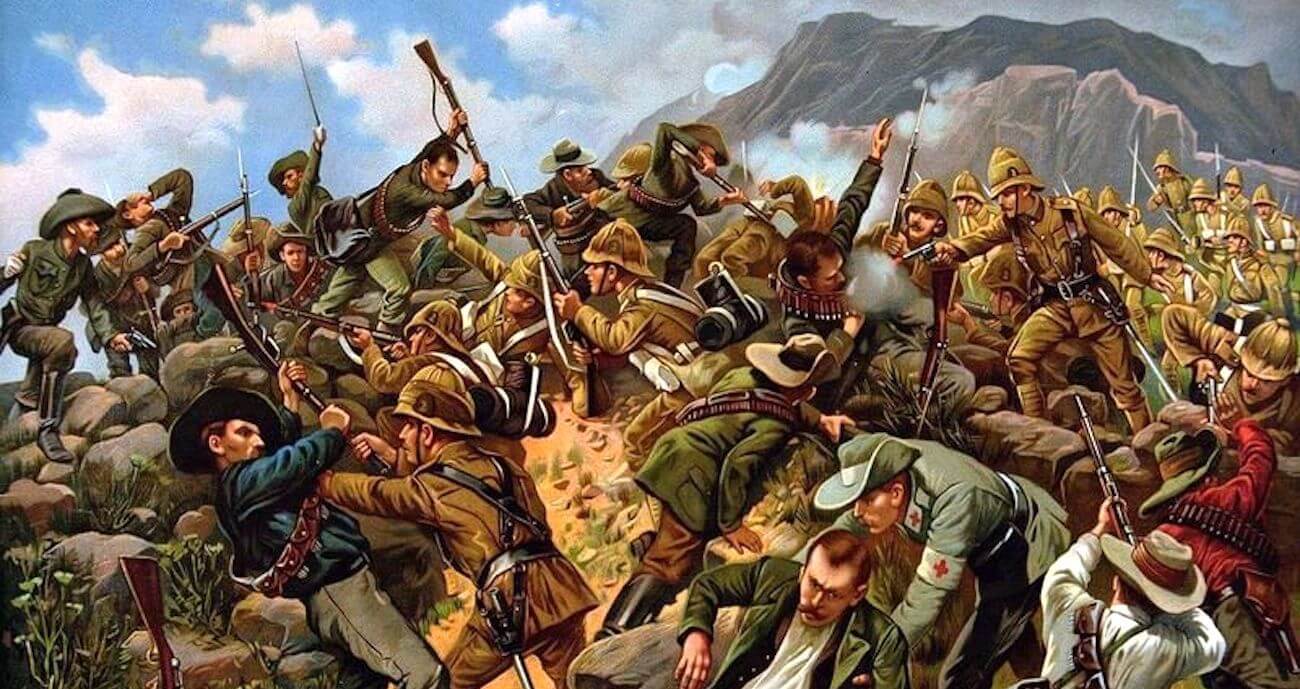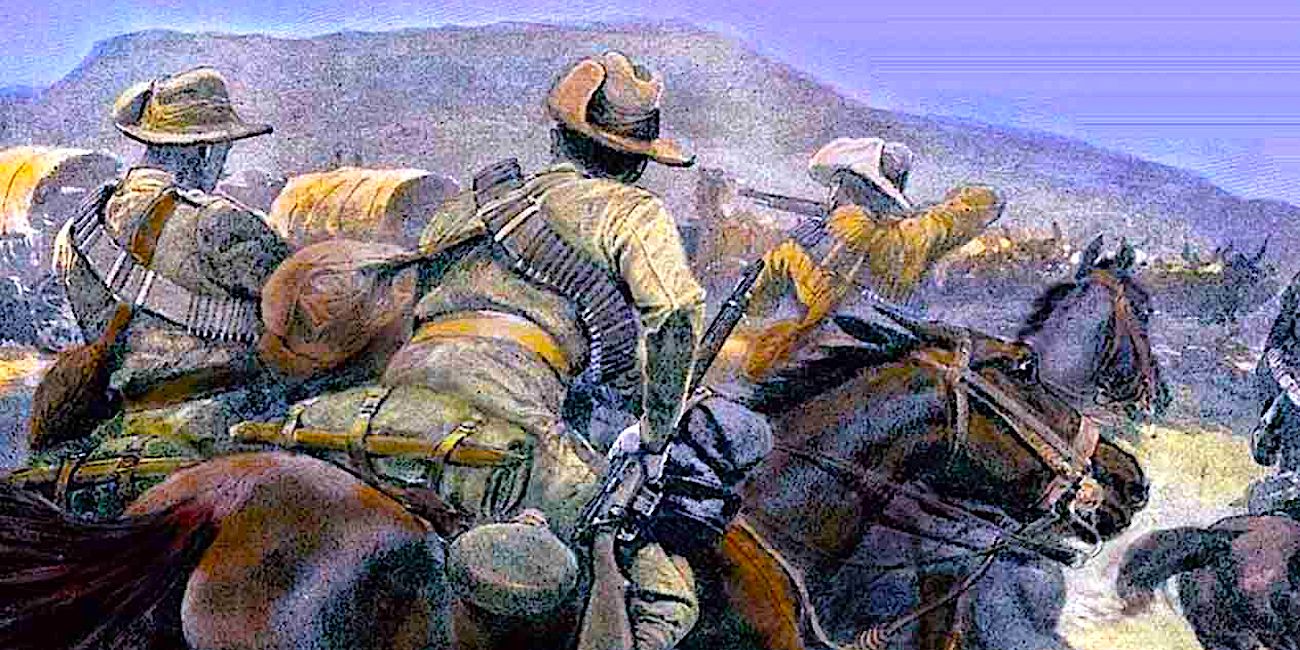St Ives men who died in the Boer War
In Broadleas Cemetery is the following inscription on a family headstone.
Daniel is one of four St Ives men who died in the Second Boer War. The memorial in Huntingdon lists their names with twenty-four other men of the county who died in the South African War 1899 to 1902. Read on to learn more about the Boer War and the life stories of the St Ives men who took part.
Origins
The first European settlement in South Africa was Dutch. Britain established a permanent presence in 1806. A century of conflict followed.
The first European settlement in South Africa was Dutch. Britain established a permanent presence in 1806. A century of conflict followed.
The Boers were itinerant Dutch farmers living on the colony's frontiers. Dissatisfied with Britain's abolishment of slavery, from 1836 the Boers began the Great Trek to escape British rule. They established independent republics.
The discovery of diamonds and gold caused an influx of 'foreigners' from Britain. Tensions arose when newcomers began to outnumber the Boers. There was a danger the Boers would lose control if the 'foreigners' gained full voting rights. Britain was keen to gain ownership of the rich resources in the Boer republics.
In 1899 Britain demanded voting rights for all. The Boers delivered an ultimatum to the British Government. They demanded the withdrawal of British troops from the republics' borders within 24 hours. When the British Government rejected the ultimatum, the Boers declared war.
Initially the Boers had some success. Preemptive strikes into British territory gained them a series of tactical victories. In response the British increased their forces and recovered lost territory.
For the final two years the Boers operated a hard-fought guerilla war. They harassed British troop and supply bases. In response, the British conducted a scorched earth policy. British soldiers destroyed Boer farms and cleared whole areas of farmland.
It was British policy to send captured Boers abroad. The majority of the 28,000 prisoners of war suffered this fate. Women and children found themselves in concentration camps. They faced overcrowding, inadequate shelter, neglect, poor hygiene and bad sanitation. Food supplies were meagre and unreliable. A two-tier system meant those families with men still fighting got lesser rations. Over 27,000 died in the camps of malnutrition and disease. The Boer forces finally surrendered in May 1902.
The British Government believed the war would be over in months. After three years it cost £200m (today £25,000m) and was unpopular with the public. Over 13,000 British soldiers died of disease, far more than the 7,500 killed in combat. Wounded totalled 40,000. The Boers' guerilla tactics were a new form of war.
St Ivians who died in the Boer War
In 1904 local dignatories gathered in All Saints Church for the unveiling of a brass plaque commemorating the four St Ives men who died in the Boer War. (Cambridge Independent Press 8 Jul 1904). The plaque is located by the north door and remembers the following men.
DANIEL HOPKINS lived with his parents in New Bridge Terrace, over St Ives bridge, in 1901. He worked for his father as a coach smith. Born in 1868, Daniel spent his childhood in 25 Victoria Terrace, around the corner from Filbert's Walk. Things were cosy in the small home, shared with three brothers and two sisters.
Daniel had itchy feet. He'd already lodged in Hornsey with his elder brother. Daniel left St Ives in spring 1901 for South Africa searching for adventure.
Young men from England and the Empire could sign on as horse handlers. Thus they gained passage on one of the transport ships. Another option was as an 'indulgence passenger', paying a small amount for bed and board.
Once in South Africa Daniel enlisted with Rimington's Guides in May 1901. A mounted infantry numbering about 100, they consisted in the main of English-speaking South Africans. Rimington's Guides were nicknamed 'The Night Cats' because of their night marches and stealthy movement. They were rather dashing in slouch hats with leopard skin headbands, as shown in the image below.
During the night of Thursday 19 December 1901 Daniel and his colleagues moved towards Tafelkop. The aim was to defend a series of blockhouses in the area. Overnight there were severe thunderstorms. Lightning killed three of the men.
At daybreak on Friday 20 December they settled near Bacchante Farm. They observed British soldiers heading towards Tafelkop, driving cattle before them. The approaching troops even fired towards a group of the enemy. In fact the force approaching was the enemy. The Boers' ruse worked.
The Boers overwhelmed Rimington's Guides. The ensuing slaughter was pure murder. Hundreds of the enemy surrounded Daniel and his colleagues. They poured explosive bullets in from 30 yards. The Boers killed or injured all but three of Guides. The Boers then finished off the wounded. A local newspaper published an account of the battle (Cambridge Daily News 28 Dec 1901).
Recorded as dying of wounds the following day, Saturday 21 December 1901, Daniel was 33 years old. His 'adventure' had lasted a mere seven months. The Hopkins family headstone in Broadleas Cemetery, St Ives, remembers him.
ALBERT COOKE was born in St Ives in 1876. The family home was at 6 Vicar's Row, near The Waits, shared with six siblings. Albert's father was a bootmaker.
Albert may have enrolled in the British Army's King's Royal Rifle Corps (KRRC) whilst in his teens. On 30 October 1899 he was part of a force allocated to defend Ladysmith. During the night march to get there the KRRC became detached from other forces. They found themselves in a precarious position at the foot of Lombard's Kop.
A superior Boer force kept the KRRC pinned down throughout the day. The KRRC had little ammunition. The enemy had scattered the mules carrying their supplies. They were ordered to retreat to towards Ladysmith. The troops stood up from the comparative safety of cover to walk away. This provoked a storm of fire from the Boers. KRRC casualties were 57 killed and 245 wounded.
Albert was one of those wounded. There is no record of him after this date.
REUBEN BUTLER had a similar upbringing to Albert Cooke. Born in St Ives in the same year, his father was also a bootmaker and he had six siblings. The family home was at 12 Crown Street. Reuben's mother died when he was aged 10 years. Aged 15 years, Reuben worked as a newsboy. Later he worked as a painter.
In December 1898 Reuben enrolled for 12 years with the Royal Engineers, aged 22 years. It wasn't to his liking. Five months later he deserted. He may have deserted a further two times.
By 1902 he was back in service with the Royal Engineers and in South Africa. Reuben died of disease in March 1902, two months from the end of the war. He is buried at Machdodorp, South Africa.
THOMAS MACROW was born in St Ives in 1866. He lived with his parents and two siblings in Campion's Yard. Thomas' father worked as a french polisher.
In 1884 Thomas enrolled with the Army Service Corps, aged 19 years. He married Rose Thorpe in 1891. They had four children.
Thomas died of fever, most probably typhoid fever, in South Africa in January 1900 and is buried at Sterkstroom. There is no further record of Thomas' life.





No comments:
Post a Comment